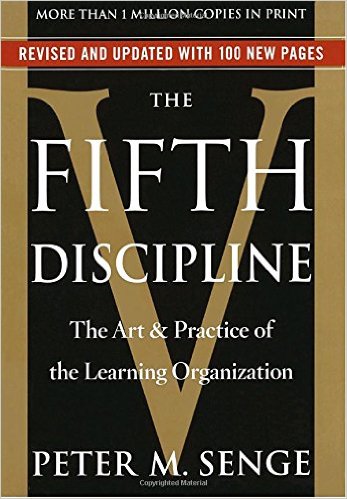
by Gary Reinecke | Jan 30, 2017 | Uncategorized |
How many times have you bought a highly recommended book just to let it collect dust on your shelf?
One of those books for me has been “The Fifth Discipline” by Peter Senge. This book has been and continues to be a strong proponent for creating a culture of coaching within an organization, whether it be a business, a church or mission agency. How is that you ask?
Let me explain the five disciplines of healthy organizational life according to Senge.
- Personal Mastery – is the discipline of continually clarifying and deepening our personal vision, of focusing our energies, of developing patience, and seeing reality objectively.
- Mental Models – are deeply ingrained assumptions, generalizations, or even pictures or images that influence how we understand the world and how we take action.
- Shared Vision – involves the skills of unearthing shared “pictures of the future” that foster genuine commitment and enrollment rather than compliance.
- Team Learning – starts with “dialogue,” the capacity of members of a team to suspend assumptions and enter into a genuine “thinking together.”
- Systems Thinking – integrates the disciplines, fusing them into a coherent body of theory and practice.
With these as a framework for healthy team life, contemplate how the following might enhance your team.
- If you could help people continually see reality objectively.
- If you could challenge team members unpack their mental models.
- If you could engage people in a shared vision.
- If you could foster a value for team learning.
- If you could integrate these disciplines in a systematic way in your team…
What difference would it make?
I want to challenge you to pick-up the book. If it is on your shelf and you have already read it, browse the titles and subtitles or take note of text you highlighted. Now reflect on the points above and envision how the five disciplines might impact your team, organization, or ministry.

by Gary Reinecke | Jan 20, 2017 | Uncategorized |
The hard work of coaching requires the coach to slow down, go below the surface and uncover key issues.
Not too long ago I was meeting with a pastoral leader who wanted help supervising a new staff member. The new staff member struggled with feedback. They winced when it was given and quick to excuse or diminish the helpful insights. On top of that, he continued repeating the same mistakes. I had several ideas swirling around in my head but I stopped, challenged and chose to remain present.
Then I asked him the following:
- What was the source of the staff member’s insecurity?
- What had the pastoral leader tried to help him receive feedback?
- What had worked in his past experience?
- What strategies could he brainstorm?
- What would he do?
Receiving feedback is a learned skill. Helping someone grow in this area can be a game changer. What are some ways you have helped those you coach exercise this important leadership muscle?

by Gary Reinecke | Jan 17, 2017 | Disciplemaking, Leader Development, Personal Development |
A life-giving gift you can give those you coach is what I like to call “pruning”. I have found that the four categories below serve as a helpful guide to follow using Covey’s, “First Things First” matrix. Take a moment right now to review how you are using your time this week.
- Pull-out your calendar.
- Prioritize your scheduled activities in one of four categories:
- Quadrant I – Important & Urgent.
- Quadrant II – Important & Not Urgent.
- Quadrant III – Not Important & Urgent.
- Quadrant IV – Not Important & Not Urgent.
- How can you spend more of your time in Quadrant II in 2017?
Coveys’ point is that most of us spend too much time in Quadrants III & IV; to the neglect of Quadrant II. Imagine how this exercise might benefit the people you coach. Fast forward to December, if a leader doubled her or his time in Important & Not Urgent activities, what impact would it have on their:
- Personal development
- Disciplemaking
- Leader Development
Happy pruning!

by Gary Reinecke | Jan 6, 2017 | Church Multiplication, Disciplemaking, Leader Development |
To kick-off the New Year, I propose a guiding question for you and those you coach to further the work of catalyzing disciplemaking movements:
What is your most fruitful activity this year to catalyze disciplemaking movements in your community?
Reflect on that for a moment. What is your strategic focus for 2017? …for those you coach?
I look forward to reading your response below.

by Gary Reinecke | Jan 3, 2017 | Coach Training, Disciplemaking, Leader Development, Personal Development |
I’ve found that one of the ways to help leaders learn how to coach is to first, be coached.
I remember serving as a coach mentor for a network of church planters. A leader in that group had a particular understanding of the posture of a coach that collided with the non-directive approach I was taking. If you mapped out a continuum with “non-directive” on the left side and “directive” on the right side – he was on the far right end.
Over the next couple of appointments I reinforced the power of coaching using a non-directive, self-discovery process until he came to the realization that he really did not like that style of coaching. He concluded that his advice-giving preference suited his personality. I agreed – but challenged him to call it something other than coaching When you experience what it is like then it is easier to embrace (if your goal is to facilitate a self-discovery process) or REJECT coaching.
Justifiably, there is room for confusion about coaching as it relates to developing leaders, disciplemaking and church planting. After-all, many people use the term “coaching” to describe what they do.
Here are three reasons why it is helpful for people to experience coaching:
- Put flesh to the coaching process e.g. it is difficult to understand what you have not experienced.
- Illustrate what makes coaching unique e.g. the power of “self-discovery” vs. receiving advice.
- Contrast other ways of helping people e.g. mentoring, counselling, consulting, etc.
Coaching tip of the month:
If your desire is to empower people – then use a process that allows the individual to discover and choose.
One of the best ways to take good intentions and move them to action is through coaching. If you are interested in taking your vision to the next level in 2017 please contact InFocus for an exploratory conversation. Please let us know how we can serve you.




